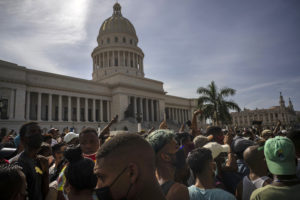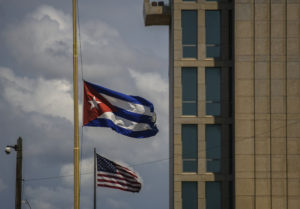By Geoff Thale
We are getting closer to having a clear picture of what Cuba's economic reforms might mean for Cuban workers. Two long-awaited developments:
On December 11, Cuba announced a new law on private, non-agricultural cooperatives. While the growth of self-employment (cuentapropismo) in Cuba has been important (nearly 400,000 licenses for self-employment have been granted) it has, by definition, been limited to small-scale enterprises, such as barbershops, restaurants, and taxi cabs. The expansion of cooperatives beyond agriculture will give Cubans the opportunity to start medium-sized enterprises with cooperative governance. (For detailed analysis on the cooperatives law, see The Cuban Triangle, here.)
On December 13, news reports suggested that the Ministry of Labor and Social Security, along with the Cuban trade union federation (Central de Trabajadores de Cuba, CTC) would organize a series of “popular consultations” on reforms to Cuba´s labor code. Such consultations are a common method of seeking citizen input and support in Cuba. When the Cuban government announced an ambitious framework for economic reforms in April 2011, it had already engaged in a lengthy process of popular consultation. Across the country, in workplaces, schools, and neighborhood centers, Cubans debated (openly and freely, according to many reports) the economic reforms. While there are questions about how much these consultations influence eventual policymaking, the announcement of a consultation indicates that the Cuban government is serious about a given policy change and want to get as much buy-in as possible from Cuban society.
So, why are changes to the labor code in Cuba so important?
First, a brief overview of Cuba’s labor code and its function:
The labor code is a comprehensive piece of legislation that regulates work in Cuba. The labor code has been under review since the announcement of the guidelines for economic reform in April 2011, with the recognition that Cuba´s labor law needs to adapt to Cuba’s changing economy and needs to provide a framework for protection of workers in the private sector. The labor code seeks not only to define basic regulations for the workplace, but also to define in detail the role of labor unions, to outline minimum vacation days and daily rest periods, and to establish criteria for firing workers. To a U.S. reader accustomed to a labor relations system in which employers make many of these decisions unilaterally or through collective bargaining, the Cuban labor code appears at times more like an employee handbook than like government legislation. It is a clear example of the ways that Cuba is in many respects still a centrally planned (sometimes centrally micro-managed) economy.
Many critics say that Cuba’s labor code violates International Labor Organization (ILO) conventions by privileging the role of the CTC, Cuba´s labor federation. (See, for instance a recent Brookings report on foreign investment, here.) The ILO has repeatedly called on Cuba to modify the labor code, permitting workers to choose between different unions.
But that´s not all the labor code does. It provides important protections and benefits to Cuban workers. While they recognize the urgent need for reforms, most Cubans don’t want to lose these benefits. Now, as the Cuban economy undergoes reforms, new labor relations that take into account cuentapropistas and cooperatives will have to be developed. The challenge for the CTC and for Cuban society is how to re-work its social contract in a way that increases productivity and incomes while maintaining protections. The Cuban government will need to adapt its social safety net—including social security, health care, disability, and education—to the changing economy. It will need to develop a new tax code (which it has begun to do). And it will need to adapt its system of labor protections, establish minimum wage levels in non-state enterprises, ensure access to labor courts for grievances, and establish a new role for unions in a society where private enterprise is expanded. A consultation process that encourages honest debate on these issues could help contribute to a revised labor code that adapts to the changing economy and the resulting changes in labor relations, while seeking to preserve an effective framework of protections and benefits for workers.
Geoff Thale is WOLA’s Program Director. Mr. Thale has studied Cuba issues since the mid-1990s and traveled to Cuba more than a dozen times, including organizing delegations of academics and Members of Congress.



